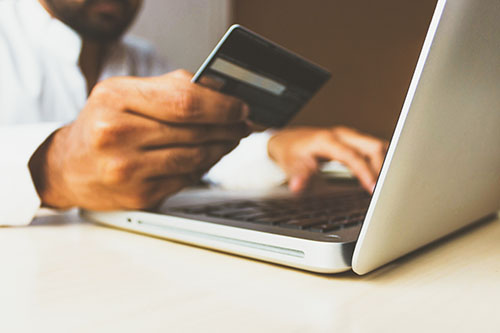FDIC-Insured—Backed by the full faith and credit of the U.S. Government.
Personal Finance
Find out how to set and achieve financial goals, use budgeting, saving money the right way, spending your money using your checking account or debit card, learn to buy a car or purchase a home, learn the basics of investing, or just learn the terms of personal finance.
Setting and Achieving Financial Goals
The first step that you need to take to achieve the financial health that you are looking for is to learn what really drives you when it comes to money and how it can help you to achieve your dreams. Once you know what drives you, you can take the right attitude towards turning those dreams into goals and moving forward to accomplish them. Your attitude towards money will also help determine how much you will need to achieve your goals, how hard you are willing to work for it, and how you will feel when you achieve it. Summed up, you need to know yourself, what drives you, what you want, and what you are willing to do to get it.

Without setting goals, you may be dissatisfied with where your life is going and how you are using your financial resources. We may find ourselves drifting along and leaving our future up to chance.
From a financial point of view this could be very dangerous. You need to plan financially for your future so that you can have one outside of the workforce when you are 82 years old.
If you ever want to retire, own your own home and car, or be able to survive day to day without worrying where tomorrow's dinner will come from, you need to set financial goals.
Budgeting
What do you think of when you hear the word "budget?" Most people hear the word and cringe. If this is you, take a look at budgeting from a different angle. Think of budgeting as a process that summarizes how you spend your income and creates guidelines for your spending. In all reality, a budget is simply a tool to increase your awareness of how and where you spend your money and helps you have control as you spend money on the things that are most important to you.

We all have income. We all have expenses. Without the proper allocation of the money that comes and goes, something may fall short. The goal when creating a budget is to lay a foundation that will help you allocate what portion of your income is required to cover each expense.
The purpose of this article is to help you develop a budget, and teach you what you need to know in order to do so. A good way to make sure you have enough money to spend and save is to use a budget. A budget helps you make sure your income matches your expenses.
Does this mean that you won’t be able to have control of your financial affairs if you don’t create a budget? No. Some people are able to do well financially without ever creating a budget. But if you are not one of them, you have nothing to lose (except your money/financial freedom).
Saving Money the Right Way
Saving money…we all want to do it. Some people actually are successful at it. Many think that they can do it are fooled into thinking they are successful at it but really aren't. And then there are those that just can't save money for one reason or another. So what happens? Why is it so hard to save money?

Many times there is something that is associated with the economy that gets in the way of all the efforts put forth to save money the right way. However, most of the time it is possible to save some money (even though it may be a few pennies) with some careful planning, a little bit of sacrifice, and a lot of financial control.
Many times people think of saving money as spending less money. They don't think of what it is to actually set the money aside to be saved. Many times is it a conscious effort to spend less, which in reality turns out to be a "spend less in this area and end of spending more in this area" type of situation.
Saving money is a process that starts with a plan. The plan needs to include goals, it needs to include a budget, and most of all it needs you to have the right attitude. Following are some guidelines to help you save money the right way.
Using Your Checking Account
You’ve seen your parents with a checkbook, and have probably even seen them trying to reconcile the check register with the bank statement. You might have even had a little bit of training in a high school class that taught about life skills, budgeting, finances, etc. And it is possible that you even have a checking account of your own. But do you really know what they are for and why you would want to have one (other than the fact that most people have them)?

A checking account is a deposit account that is held at some bank or other financial institution. The purpose of a checking account is to secure funds and make them available through a variety of channels. By virtue of being called a checking account, you are able to access those funds by writing checks. But as technology improves, and society looks for additional ways of convenience, using a debit card is the most common way of accessing the funds in your checking account.
A typical checking account is handled through careful posting of deposits and withdrawals of funds. These funds are federally protected. Generally, access of those funds is handled through the writing of checks. Use of debit cards, ATM cards, and check cards (yes, they are all different and what you get depends on what your financial institution offers) also allow you to make point-of-sale purchases and cash withdrawals from your checking account funds.
By the end of this article you will know what the benefits are of having a checking account. You will also know what different types of checking accounts exist, which you might benefit most from, and how to manage that account.
Using Your Debit Card
More than two-thirds of American households have debit cards (also referred to as ATM cards or checking cards). But does everyone really know what a debit card is and how to use it? Are you aware of the pros and cons of having one?

Debit cards look and, in some ways, act like credit cards. They allow you to make purchases without carrying cash or the check book. They allow you to withdraw money from ATM machines. And if they have the Visa or MasterCard logo on them, they are accepted anywhere Visa and MasterCard credit cards are accepted. So what's the difference?
Debit cards are truly a convenience. But if you don't keep track of your purchases, your checking account balance and, most of all, the card itself, you could face some major problems. For example, overdraft fees occur when you use the debit card to make purchases that total more than what you have in your checking account.
Also, purchases made with a debit card can't be disputed or refunded as easily as those made with credit cards. This is especially important to understand should you accidentally lose the debit card or have it stolen.
Buying a Car
Decided it is time to buy a car and not sure of what to do? Whether you are buying for the first time or have gone through the process a few times before, there are a few things that you should be aware of from beginning to end to make sure that you end up with what you want (or at least what you can afford and happen to like) and have it be a successful purchase.

The first thing that you need to know to begin the process is whether you want a new or used car. There are pros and cons to each, and they aren't just financially related. Let's look at some facts that will help you decide on that answer.
There are more than 2 million car accidents annually. Most of those accidents include more than one automobile. When you study out those numbers and consider that many owners replace their wrecked car with a new (or newer but used) car, it is very possible that you could end up with a used car that has already been dinged or smashed.
Information that you should find out about any used car you are considering should include (but not be limited to) the following: the number of previous owners, if the car was involved in any previous accidents, any previous mechanical problems, and the maintenance history of the car.
Buying a House
Whether you are a first time homebuyer or a homeowner deciding to make a change, there is a lot to know about buying a house. With the help of this article, you will be better prepared to make that giant leap and assume a responsibility that you may not have felt before.

That is right...house shopping and buying brings about a great responsibility. You probably wouldn't like to have such a big responsibility and not know how to assume it correctly. For example, some people would rather go it alone when shopping for a house.
How about you, do you need a realtor? If so, who would you go with? And what about a loan? Can you get enough to buy the house, and if not, can you negotiate down the price of the house? So much to know and do. Just make sure you start out right.
The most important step in purchasing a house, and the place you should start from, is to look at the financial side of the adventure. There are three specific factors: 1) How much can I afford, 2) How much will it cost, and 3) Can I get the loan.
Investing
You have heard it talked about in social circles, at work, and on the news. One way or another you are hearing about investing. If so many people are investing, it must be a good idea. So ask yourself, "Why is investing such a good idea, and what should I do about it?"

The simplest answer to why investing is such a good idea is because it is a way for you to create wealth. It is a process that is painless (no physical labor involved other than typing on your keyboard or dialing a phone number). Also, the rewards can be plentiful.
By investing your money in the stock market you can end up with a lot more money for retirement. What?! Take money and buy stock and it will turn into more money? Not exactly. There is a lot to know about investing.
Investing is devoting your time, resources or effort to achieve a desired goal that you have planned for. Investing money is the same process, but with a focus only on growing that money.
Disclaimer: Information found within this page are for informational purpose and does not represent bank practice or services offered at its entirety.
